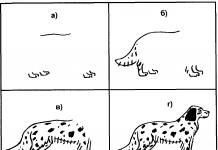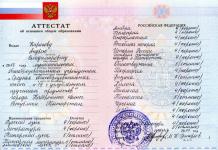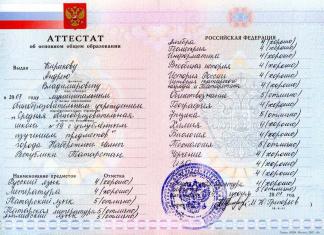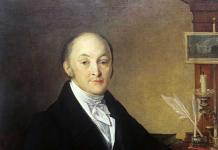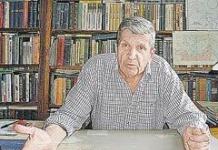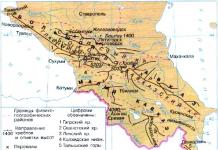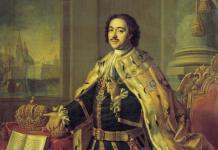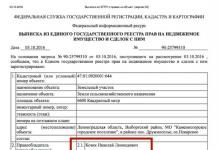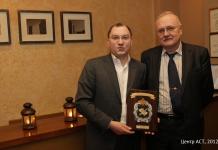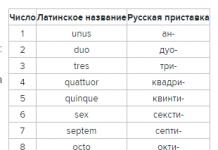Lorenz von Stein (1815-1890)
Author of works on the theory and history of state and law, state, administrative, economic, financial, railway law, justice, the theory of socialism and communism, taxes and public loans, theory of politics, political economy, problems legal education etc. The most important for world legal and political thought are: "Socialism and Communism of Modern France" (1842), "The Socialist and Communist Movement in the French Revolutions" (1846), "The History of the Social Movement in France from 1789 to the Present Day" (1850), "The System of the Science of the State" (1852-1856), "The Doctrine of Management" (1865-1868), "The Modern and Future of the Science of State and Law in Germany" (1870), "The Modern and Future of the Science of Law" (1880).
The theoretical and methodological position of L. von Stein was between the rationalistic philosophy of Hegel, from whom he adopted the dialectical method and the formal opposition of the state and society, and the French socialist doctrines, from which he borrowed the economic factors of the legal system. From such a platform, he proved the impotence of his contemporary legal science and demanded that a philosophy "built on real ground" be laid to the conceptual foundation of jurisprudence. The science of law for Stein was the science of the state. He sharply criticized the then popular positivists, who turned this science into "a simple knowledge of positive laws", and opposed them own understanding jurisprudence as "the science of those forces that give rise to law", a science that explains the elements and foundations of the development of legal phenomena.
Stein saw the origins of the state in the embryos of the social organization of the life of individuals who, at a certain stage of evolution, were unable to satisfy their own needs. individual work. This led to the subordination of the strong to the weak, the desire of the rich to take precedence over the poor. As a result, a society has arisen in which injustice, inequality, and lack of freedom prevail. The state as the highest form of coexistence of people helped to resolve this contradiction. She eventually became a collective individual capable of self-consciousness as a higher intellectual personality. its task is to ensure the freedom, material well-being and spiritual growth of every citizen. The will of the state should not be a reflection of the will of a class or political force, but should correspond to the total will of all the individuals who inhabit it. Consequently, only the state, behind Stein, is able to raise the disadvantaged masses, the weak, to the level of the rich and strong, and restore the freedom and equality that existed even before the creation of society.
In this appointment of the state - its obvious advantages over society, which is based on economic fundamentals, the motive of self-realization of the individual. In society, a class that possesses property and a class that does not have it objectively arise. Such a division cannot be abolished either under socialism or under communism. So, these ideas are unrealizable, utopian, although they "completely correspond to the noblest inclinations of the human heart, its cherished aspiration and desire." However, society is not an amorphous collection of individuals, since they depend on each other. If in society everyone is guided only by their individual will, which leads to inequality and injustice, then the state is able to create a self-organized system from such wills, which ensures the rights and freedoms of the individual. Even in contemporary history for Stein, the state and society were dialectically opposed: the state sought to create an acceptable social system for it, and society sought to give the state as many signs of society as possible.
In order to fulfill the historical role in restoring freedom and equality, the state must rise above society, subjugate it to itself. Democracy, a republic, cannot do such a task, because society itself plays a too important role in shaping the foundations of governance: democracy is a "non-state form of coexistence", and a republic is a "distortion of the idea of statehood", since it subordinates the state to society. Not capable of performing such noble functions and absolute monarchy. The ideal state is a "social constitutional monarchy" of the Prussian model, which stands above society, classes and parties. A component of the content of the legislature is the self-determination of the will of the state, the executive - public administration in the main sectors: economy, justice and internal management. Stein divided the executive power, whose activity is regulated by administrative law, into administrative and coercive. At the initial stages of the development of the state, the difference between laws and administrative acts was almost not noticed. The law began to be understood as a national will and to be accepted by popular representation only under a constitutional monarchy. Acts of the executive power come into legal force only if they fully comply with the laws as a reflection of the state will. The contradiction in the law determines the responsibility of the ministers in political and judicial forms.
In a constitutional monarchy, districts, provinces, cities and communities are distinguished, which operate on the principles of self-government. Such autonomous units are formed on a national scale. These are estate, class, industrial, agricultural, commercial and other public associations that form a system of "union social structure" and actively cooperate with the executive branch, especially in the areas of socio-cultural state building.
Stein's field of vision was the regulation of administrative "internal management". He divided it into: 1) the management of a person's personal life, to which he ranked the management of spiritual processes (science, education, culture) and the regulation of "human physical development" (reproductiveness of the population, food and clothing, health care); 2) management of the state economy (problems of property, industry, agriculture, communications, financing, taxes, loans, money circulation, lending); 3) control public associations, to the sphere of which Stein, in addition to allied corporations, introduces the family.
Stein defined the rule of law state as a state that "has a constitutional administrative law", "where administration is carried out in accordance with the spirit of the constitution", and the law "is based on the constitution", where "guarantees are established for the rule of the law over the order, and the constitution - over the law." In Stein's legal state, the legislative power "reigns" over the executive, and the monarch "ensures the dominance of the national will" and is "the supreme defender of the interests of the weak and oppressed." In other words, the monarch is the "supreme center of the state", its "highest personal principle."
Describing the supra-class social constitutional monarchy as an antidote to socialism and communism, Stein simultaneously made innovative works on the historical study of new phenomena, their scientific criticism, one of the first to define the concepts of "socialism" and "communism", strictly delimiting them from each other, and proved that French socialism is not an invention of France alone, it is a universal heritage. He argued that the movement of the proletariat for socialism was just beginning, that future revolutions could only be social, and that the time was not far off when "both Europe and the world would tremble from socialist revolutions."
nobleman, tsarskosel, poet, Slavic philologist, critic and translator, husband of Anna Akhmatova's elder sister Inna Andreevna Gorenko, acquaintance of N.S. Gumilyov, an emigrant.
The history of the Stein family has not previously been described in detail anywhere, and the available publications are replete with inaccuracies and errors. However, the family members themselves are partially to blame for this, who, in their biographical notes, repeatedly wishful thinking. 1
The earliest document related to the family history of the Steins is a certificate Franz Ivanovich Stein(1780-?), a military officer from the Polish gentry of the Volyn province, who rose to the rank of lieutenant in 1807.
On February 28, 1811, he was “resigned from service at a personal request and appointed to the Volyn province by the Kremenets Zemstvo police officer, in which position he was until April 21, 1816.” 3
This Franz is the great-grandfather of our Sergei. Franz Stein remained a widower for a short time after his first marriage and soon connected his life with a beauty, the daughter of a poor nobleman of the Yaroslavl province, a retired captain Vasily and Olga Ivanovna Logvinov, Varvara Vasilievna. As Sergei Stein writes, the bride stipulated the transition of the groom to Orthodoxy as an indispensable condition of marriage. From that moment on, all the Shteins along the line of Franz Ivanovich belonged to the Orthodox faith. 4
In the marriage of Franz with Varvara Vasilievna, children were born: Alexander, Ivan, Arkady, Nikolai, Mikhail and Marya.
The three sons of Franz Stein chose the military path. Sergei's grandfather Ivan Isidorovich Stein(1825-1871), was born on January 6, 1825 in the Balandinsky town of the Atkar district of the Penza province. Having chosen a military career, he served bravely and finished it in 1871 with the rank of colonel as head of the Shostka capsule institution. 5
October 12, 1871 he “he went to work at the neighboring Mikhailovsky powder factory, was thrown out of the carriage by enraged horses near the factory guardhouse. Raised without feelings and in the blood, and without regaining consciousness, he died the next day.
Widow of Colonel Stein, Natalia Ivanovna Stein (née Mileiko, 1832-1875), left with three sons - Vladimir, Eugene and George. The eldest son, Vladimir, at the time of the tragedy was studying at the Imperial University of St. Vladimir, the youngest son, George, was only 11 months old. The widow outlived her husband by only four years, the couple were buried at the Vladimir Church in Shostka. 6
Vladimir Ivanovich Stein(1853 - after 1910) - the eldest son of the tragically deceased Colonel Ivan Stein, the father of Sergei Stein, the author of biographical notes and the first representative of the Stein family, who settled in St. Petersburg.
In 1871, Vladimir Stein entered the Imperial University of St. Vladimir, completed higher education with Ph.D. state sciences at the Imperial Kazan University in 1876. Shortly after graduating from the university, he was appointed an official for special assignments of the Main Field Treasury of the army in the field. Fought with the Turks, was awarded. After that, he served in the public service in the treasury and the censorship department. 7
He combined public service with active literary and scientific activity; was a full member of the Psychological Society at Moscow University, published in the "Proceedings of the Highest Approved Commission for the Review of Taxes and Fees", "Proceedings of the Moscow Psychological Society", "Issues of Philosophy and Psychology", "Russian Antiquity", " encyclopedic dictionary» Brockhaus and Efron. He was the first in Russia to write biographies of Arthur Schopenhauer and J. Leopardi. At the end of his life, he began to write the already mentioned family history, but, unfortunately, he could not or did not have time to complete the work. 8
Vladimir Stein was married to the daughter of a major general Elena Vladimirovna Zalenskaya(1853-1907). In the marriage of Vladimir and Elena Stein, children were born:
- Sergey,
- and twins Sophia
- and Elena (1853-1907), buried at the Kazan heterodox cemetery.
The last years of Vladimir Stein's life were far from cloudless. Almost half of his files in the funds of the Central Committee of Foreign Censorship are writ of execution for the recovery of debts. The sick, lonely, debt-ridden father of the family was forced to resign on April 28, 1907 with the rank of real state councilor. During his service he was awarded several orders. 9
Sergei Vladimirovich Stein born May 3 1882 in Pavlovsk, Tsarskoye Selo district. Saint Petersburg province.
According to Sergey, he spent his childhood in Kharkov, in the house of his uncle, philologist, professor A.A. Potebni (1835-1891). IN 1891 Sergey entered the first grade of the K. Maya school, which he graduated with an average score of 3.5 in 1900 d. 10
Immediately after graduating from the gymnasium, Sergei Stein entered the Imperial St. Petersburg University at the Oriental Faculty, but already in November 1900 he applied for a transfer to the Faculty of Law, "since languages do not correspond to either interests or abilities." In 1902, he submitted documents to the St. Petersburg Archaeological Institute, from which he completed the full course in 1904, and returned to the university for the first year of the Faculty of History and Philology, where he studied with professor, historian of Russian literature, archaeographer and paleographer I.A. Shlyapkin (1858‒1918).
On February 21, 1906, fourth-year student Sergei Shtein filed a letter of resignation from the university and only in October 1909 returned to the seventh semester of the Faculty of Law. However, he did not complete the full course of the capital's university - state exams in the Faculty of Law passed in 1912 already at the Imperial Kazan University. eleven
WITH young age Sergei was in a literary environment. He was closely associated with the high school students of Tsarskoye Selo, who were passionate about poetry and literature.
Sergey Vladimirovich began his literary activity in his student years - from 1900 Published in periodicals, published articles on the history of literature in magazines and newspapers: Novoye Vremya, Literary Bulletin, Slavonic News, Slovo, Historical Bulletin, Picturesque Review, Russian Bibliophile, "Lukomorye", etc.
IN 1904 year in the journal Slavyanskie Izvestia: his transcriptions from West Slavic poetry, mainly Balkan poetry, appeared there regularly. He knew Slavic literature quite well and regretted that the Russian educated society did not know either history or literature. Slavic countries. Stein wrote:
“But we, indifferent, unfairly alien to the Slavs who are close to us by blood, do not try to replenish our utterly primitive and inconsistent information about them, about their past and present. Russian popular science literature in many branches of Slavic studies is poor and fragmentary.
Stein was interested in various aspects of Slavic-Russian literatures. As a translator, he was attracted by translations of Russian and Slavic authors. 12
Sister of Sergei Vladimirovich Stein - Natalya Vladimirovna Stein(1885-1975) was married to the director's son, a poet (married from 1904 to 1915), whose early work S.V. Stein reviewed 13 .

Natalya Vladimirovna Stein
And his first wife was the elder sister of Anna Akhmatova, who died early. Inna Andreevna Gorenko(1885-1906). autumn 1904 he and Inna Gorenko got married, and Anna Akhmatova began to visit them at the so-called "zhurfiks", where she fell hopelessly in love with her friend von Stein, a student at the Faculty of Oriental Languages.

Inna Gorenko 33
Sergei Stein developed a trusting relationship with the young Anna Akhmatova. It was to him, in a letter dated February 2, 1907, that she announced her decision to marry Nikolai Gumilyov. Naturally, Sergei Stein and Nikolai Gumilyov were connected not only by close family relations, but also by common literary interests.
IN 1906 when he edited the Slovo newspaper, A. Blok, V. Bryusov, F. Sologub, I. Annensky, N. Gumilyov and others were published in its literary department.
Sergei Vladimirovich Stein - one of the earliest literary acquaintances, was in correspondence with him. S. Stein's review of the first collection of poems by N. Gumilyov "The Way of the Conquistadors" appeared in the newspaper "Slovo" (a political publication of the Octobrist orientation) on January 21 1906 of the year. 14
"G. Gumilyov, - writes the Tsarskoye Selo philologist, - is very young, he has not fermented in him, he did not have time to creatively process much. There is no doubt, however, that he has the beginnings of a serious poetic talent ... " Stein notes that “not so much Mr. Gumilyov owns verse as verse owns him”, wondering where “the young poet has an inclination towards archaisms… strangely contrary to the author’s desire to follow the best examples of the latest Russian poetry.”
It means, apparently, Balmont. According to Stein, Gumilyov is better at poetry. with a fabulous, mystical touch”(given as an example "Dream of the night and dark"). Critic's recommendation - “great simplicity and immediacy”, and also, of course , “correction of defects in verse”. Even the best Tsarskoye villagers in their judgments about poetry were quite simple-hearted and old-fashioned.
In an article about Gumilyov, Stein wrote:
"A characteristic feature that brings together both Anna Akhmatova and Gumilyov is that their literary development proceeded with exceptional speed. In part, I am inclined to attribute this phenomenon to the beneficial influence of I.F. Annensky: he was the director of the gymnasium where Gumilyov studied, and subsequently his house in Tsarskoye Selo became a literary center that attracted all the talented.
June 15 1906 Sergey's wife, Inna Stein, died two years after the wedding at the age of 21. Akhmatova's sisters and she herself suffered from tuberculosis. A report in the Novoye Vremya newspaper:
IN 1907 Sergey Shtein undertook a long journey through the Balkan Peninsula (Bulgaria and Serbia), collecting material for his book on the history of Slavic literatures, which was published in St. Petersburg in 1908 G.: Slavic poets. Translations and characteristics. Quite highly appreciating this book, Gumilyov in "Letters on Russian Poetry" pointed out that among the exclusively South and South-West Slavic poets, Stein placed in it his translations from Tetmayer, a Pole. Gumilyov writes:
"You can't seriously put the deep Polish culture along with the young cultures of the southern Slavs. After all, then the Russians should have been included in the book."
Gumilyov was conscientiously mistaken: the first Polish poets of the "European level" are considered to be such as Mikołaj Rei (1505-1569), Jan Kochanowski (1530-1584), Mikołaj Semp Shazhinsky (ca. 1550-1881), i.e. poets of the middle of the second half of the XVI century.
IN 1908 Sergey marries a second time. His second wife Ekaterina Vladimirovna Kolesova, teacher. From this marriage, Sergei was born only daughter — Lyudmila Sergeevna Stein(?-?), her fate is unknown. 16
Newspaper " Russian word" in May 1909 published a note: "In Tsarskoye Selo on May 13, the last meeting of the circle of poets and poetesses of this season was held:““. The new season will open in the second half of September in Gatchina, and then from October the usual meetings will go in St. Petersburg. At the farewell party they attended and read Z. Bukharova, N. Wentzel (Benedict), Gangelin, Gribovsky, V. Hoffman, F. Zarin, M. Kilshtet-Veselkova, Kokovtsov, Umanov-Kaplunovsky, D. Censor, S. Stein and guest." 34
Sergei Stein was published in many journals as a critic and reviewer, he reviewed, including, and with whom he became related. From a letter from S. V. Stein to the writer A. A. Mikhailov dated April 28 1910 g., after the release of "Cypress Casket" 17:
"The late In. Fed. is a close relative of mine - and the fate of his poems is very close to me<...>My request to you is that you devote a few lines to the "Cypress Casket" attached here - in the evening "Exchange" (similar to your today's interesting article about Teffi), and if you find it possible, then in the "Russian Word". It seems to me that the book of poems by Jn. Fed., if we pass over in silence three or four poems with modernist extremes, is a real and real contribution to Russian lyrics both by the perfection of the verse and the unused novelty of many themes and moods. Be kind, dear Alexander Alekseevich, and respond to this literary phenomenon, which should not go unnoticed in our press.<...>The first book of poems by I.F.<...>m<ожет>b<ыть>delivered to you by me, because I have a few more copies of it."
Trusting at the beginning, the relationship between Sergei Stein and Anna Akhmatova became not so simple.
She said that after the release of her first poetry collection "Evening" ( 1912 ) called Stein and asked permission to visit her with his friend Zdanevich. This was one of the first writers who showed interest in Akhmatova's book, according to her, almost for the first time. “a man wanted to see her and get to know her by reading her poems.”
A year or two later, Zdanevich visited Akhmatova alone:
“The conversation turned to minor poets. Quite by chance, AA, forgetting about the friendship between Zdanevich and Stein, listed minor poets and named S. Stein.<…>A few days later, AA in Tsarskoye Selo received a telephone call from S. Stein (who lived in Pavlovsk).<…>S. Stein gave her a scandal on the phone: "Since when have I become a secondary poet for you! ..". He spoke very impolitely. AA replied that she was not well and it was cold around the phone here, and hung up..
It didn't end there:
“Several months later, Stein called Tsarskoe Selo again and asked AA and N. Gumilyov to come to him. On a sunny spring day, AA and Nikolai Stepanovich went on foot to Pavlovsk and were at S. Stein's. (Usually AA and Nikolai Stepanovich did not maintain relations with him, but in this case she was with him, considering herself guilty of offending him) ” 18 .
And these records begin with the fact that "WITH. V. Stein harbors an old grudge against AA”. Since Luknitsky did not know the whole history of Anna's relationship with Stein, their correspondence, he could believe it. But now it is clear that Akhmatova herself concealed an even more "old resentment" towards Stein. Subsequently, Akhmatova did not forget this and, in her own way, voluntarily or involuntarily, “revenged” him. Information about this is contained in Luknitsky's notes, which means that in the mid-1920s, relations with Stein still worried her.
IN 1912 S.V. Stein began to cooperate with the Pushkin House at Russian Academy Sciences (currently - IRLI), was engaged in acquisition and replenishment of funds. For this purpose, he made trips to Pskov (1914) - to collect materials relating to A.S. Pushkin in the villages of Mikhailovsky, Petrovsky, Trigorsky; to Moscow (1916, 1917, 1919) - to search for the manuscripts of the first Russian translator of "Faust" Huber (1814-1847), analyze the library and archive of the art critic of the book. A.I. Urusov (1843-1900), the search for manuscripts by the bibliographer M.N. Longinov (1823-1875) and the correspondence of the poet F.I. Tyutchev to the Oryol province (1918) to get acquainted with the state of the library of I.S. Turgenev.
With all the fascination with the brilliant world" silver age» 19 , Sergei Stein had to take care of providing for his family, mother and younger sisters. IN 1907-1914 gg. Sergei Vladimirovich served as secretary of the board of the Russian-Danube Shipping Company 20, from 1914 Clerk of the Legal Department in the Administration of State Savings Banks, with 1916 d. secretary of the editorial office of periodicals of the department of the State Savings Banks and to 1918 2008-2010 held the position of senior accountant of the Office of the State Savings Banks. 21
In July 1919 Mr. Stein was admitted to the Pushkin House as a part-time job for free employment and. O. museum curator.
IN 1918 Mr. Stein first tested himself as a teacher - he taught a course in political economy and a course in general aesthetics at the Tsarskoye Selo People's Conservatory. In 1919 he gave lectures on literary antiquity in Tsarskoye Selo at courses at the Commission for the Protection of Antiquities and Art 23 .
Of course, Sergei Stein considered literature, history and art to be the main meaning of his life. Even while studying at the university, I read a number of reports in the Circle for the Study of the Encyclopedia of Law and at practical classes on the history of Russian law. He specialized in the study of police law, worked on the essay "Russian Legislation on the Press". Later consisted academic secretary Serbian branch of the Society of Oriental Studies, member of the Petrograd Archaeological Institute, Russian Bibliological and Bibliophile Societies, Trade Union of Workers fiction 24
But Sergey Stein did not have enough laurels as a writer, historian and teacher, and in August 1917 he was elected a member of the Pavlovsk City Duma and later became its chairman.

In October 1919 G. “By the will of the population, when the city of Pavlovsk was occupied by the troops of General. Yudenich again took over the management of city affairs, and during the retreat of the North-Western Army he was forced to emigrate to Estonia. Thus, at the end of 1919, Stein ended up in Estonia, where he received citizenship and a teaching position at the University of Tartu, he was left without his usual literary environment, and a large family library and archive remained in Pavlovsk. 25
Then, obviously, the second marriage of Sergei Stein with Ekaterina Kolesova broke up. Catherine subsequently married comrade Sergei Stein, a famous writer, poet and artist from Tsarskoye Selo. 26
WITH 1920 By 1928 gg. Stein, with some interruptions, lectured at the University of Tartu on the history of Slavic, Serbo-Croatian, Czech and Slovak, Bulgarian and, of course, Russian literature.
In parallel, Sergei Stein returned to journalistic and political activities, taking an active part in the social life of the Russian diaspora in Estonia. When the Russian Academic Group in Estonia was formed in Tallinn, he first entered the Provisional Committee of the group, and in April 1921 was elected to the board of the group 27 by the general meeting.
Published articles on literary themes in the newspapers "Free Russia", the weekly "Clouds". In the newspaper Posledniye Izvestia he published an obituary essay on Gumilyov 28 and memoirs on Alexander Alexandrovich Blok, more than 240 articles in total. However, having headed the newspaper "Latest News" in 1926, S. Stein could not cope with financial difficulties, and in 1927 the newspaper was closed, unable to withstand competition with the Riga edition of "Segodnya".
Unfortunately, inaccuracy in calculations and inability to distribute forces led Stein to a series of events that ruined his reputation and caused him to leave Estonia. Such negative events include losing the election to fill the vacancy of a professor of Slavic philology at the University of Tartu; Stein's scandalous failure to defend his doctoral dissertation; financial collapse of the newspaper.
IN 1928 year, he was unable to defend his doctoral dissertation on A.S. Pushkin.
The unusual story of Stein's unsuccessful defense gave rise to a myth that was cultivated from a pseudoscientific point of view. Boris Pravdin, once the head of the Tartu "Poet Workshop" - the so-called. "two Yuris, four Boriss" - and after the war ... well, perhaps at best - a "Soviet poet" (although there are reasons to suspect much worse). Stein's failure in defense he transferred to his entire teaching activity.
In the article "Russian Philology at the University of Tartu" (1952), in the spirit of the times, he writes about the low level of requirements for doctoral dissertations, citing Stein's work as an example: "When in 1928 the white emigrant S. Stein, who worked at the University of Tartu as a "private assistant professor", hastily concocted a dissertation in which he tried to "prove" the strongest influence of E. T. Hoffmann on the great Russian poet Pushkin, who was allegedly convinced " mystic", then this dissertation was allowed to be defended and even published in the "Scientific Notes" of the University "". Everything was sewn with white thread: Stein remained in exile until the end of his days; only now it is clear why and by whom the legend about Stein's role as "Khlestakov from literary criticism" was composed. Did Stein poetic translation after the release of the anthology in 1908 - so far it has not been possible to establish.
In June 1928 Mr. S. Stein left for Riga, leaving behind a lot of debts: undelivered books to the university library, a debt to the Russian Archives in Prague, unfinished settlements with the Vozrozhdeniye bookstore, a lack of funds intended to help S.N. Molchanov. The faculty council petitioned the university board to expel Stein from the teaching staff with the wording "for misbehavior." At the same time, he was removed from the Russian Teachers' Union and from the Russian Academic Group. In Estonia, Sergei Stein became "persona non grata", where the myth of "Stein-Khlestakov" stuck behind him. .29
Stein not only revealed himself as a dishonest person in the eyes of Estonian society, but strictly speaking, he turned out to be such a person before Akhmatova as well. Indeed, in the second letter to him, Anna made a postscript:
“Please destroy my letters. Needless to say, of course, that what I am writing to you cannot be known to anyone.
A decent person would have done just that, or, on occasion, would have returned these letters to Anna. But Stein-Khlestakov, of course, was not like that. He left the letters, perhaps simply forgetting about them, to his second wife Ekaterina Kolesova, who married the art critic E. Gollerbach, who eventually took possession of the letters. And he also did not return them to Akhmatova.
Moreover, in 1922 Mr.. published an excerpt from a letter concerning the publication of the Sirius magazine by Gumilyov. This aroused the indignation of Akhmatova, and she, according to Kralin, “I never forgave Hollerbach and until the end of my days treated him with contempt”. In the end, Hollerbach in April 1935 handed over these ten letters to the State Literary Museum. Few people now understand that at that time this act was tantamount to a denunciation to the NKVD.
Shortly thereafter, relatives of Akhmatova were arrested, and the authorities began blackmailing Akhmatova with these arrests for many years. This event is mentioned in the diary of E.S. Bulgakova, wife of Mikhail Bulgakov: “Akhmatova has arrived. Terrible face. Her son (Gumilyov) and her husband, N.N., were arrested in one night. Punin. I came to submit a letter to Ios. Vis."(entry dated October 30, 1935).
In Riga, Stein could not find a place to apply his talents and applied for a vacant position as a teacher of the Russian language at the Libava Russian Gymnasium. However, even here he showed a quarrelsome character, came into conflict with the director of the gymnasium D.A. Tikhonravov. "March 1<1929 g. - Auth.> at a closed meeting Pedagogical Council relations between Stein and Tikhonravov became so aggravated that it was only thanks to the presence of the other members of the council that a clash was avoided. The unfortunate incident caused great excitement in the Libavian teaching circles, as well as among the parents. It was decided to send a telegram to the Minister of Education and the Russian Department, in which parents, teachers and even students are asked to take measures to eliminate S.V. Stein" 30 .
IN 1931 S.V. Stein moved to Belgrade, read a number of lectures at the Serbian People's University named after Kolarac, published a number of articles on literary topics in the Yugoslav periodical press.
IN 1933 Stein moves to Dalmatia. Autumn spent in the study of Russian manuscripts in the Montenegrin State Archives in Cetinje, where he traveled from Dubrovnik, where his family lived. March 12 1934 Sergei Vladimirovich returned to the Roman Catholic faith of his ancestors.
WITH 1935 Mr.. served as a professor at the High Philosophical and Theological School under the Dominican Order in Dubrovnik, where he taught the history of Russian religious philosophy and the Russian language. In Dubrovnik he was treated with great respect, especially among the Roman Catholic clergy. Anniversaries of Professor Stein - 35th anniversary (1935) and 40th anniversary (1940) of his literary and scientific activity- were noted in Dubrovnik by the publication of a brochure about him and articles in several Yugoslav magazines. The library of the Franciscan Monastery in Dubrovnik still holds almost all of his works published in Yugoslavia to this day.
Already in 1935 Sergey Vladimirovich had major works prepared for publication, which, apparently, were not published. In the book of memoirs of Sergei Stein, there was the only mention of the name and photograph of his third wife, Margarita R. von Stein. 31
During the Second World War, during the occupation of Dubrovnik by Italy and after the liberation of the country, the traces of Sergei Vladimirovich Stein are lost. He spent the last years of his life in West Germany and died in Munich 1955 G.
The memoirs of Sergei Stein entered the scientific circulation in 1980 year. important place among Stein's memoirs, it is assigned to the Tsarskoye Selo writers. Apparently, Stein really missed Tsarskoye Selo and Pavlovsk, where his house, friends, son, and library remained. In Tartu, he was looking for something in tune with Tsarskoye Selo life. In the article "Yuriev Impressions" (Russian emigrants still called Tartu Yuryev) Stein wrote:
"This university town is very reminiscent of the palace cities: Tsarskoye Selo, Peterhof, Gatchina and Pavlovsk. Like them, Yuryev is drowning in greenery<...>Another similarity that brings Yuriev closer to the palace cities is the predominant type of architecture of most of his buildings, both public and private. This is mainly - strict and stylish Alexander "Empire".
The literary memoirs of Stein-Tsarskosel are connected primarily with the image of I. F. Annensky. Literary contacts I.F. Annensky and S.V. Shtein were most intense in the first half of 1906, when Stein, who was in charge of the literary department in the Slovo newspaper, attracted Annensky to cooperate.
In his memoirs about Annensky, Stein wrote: "Seven recent years his life, I enjoyed his friendly closeness. "However, about Stein's attitude towards Annensky was ambiguous. In September 1923, he wrote an article "Dear guest. (On the stay of Prof. F. F. Zelinsky in Estonia)". Zelinsky, who taught at St. Petersburg University for about 40 years, was Stein's university teacher. Stein writes about Zelinsky as the best translator ancient authors.
In Stein's memoirs, there is no that inert Tsarskoe Selo, which Anna Akhmatova so often recalled, where they did not understand Annensky, they hounded Gumilyov. This is a traditional "city of muses", covered with elegiac memories.
Prepared by the specialists of the Museum of the Nikolaev Gymnasium, who are deeply grateful to M.T. Valiev for providing materials about the Stein family
Sources:
- Valiev M.T. "History of the Stein Family - Myth and Reality". Genealogical Bulletin, No. 53, St. Petersburg, 2016. 216 p., ill. P.90-110. Many research documents are introduced into scientific circulation for the first time.
- There. Link to: TsGA St. Petersburg. F. 7240. Op. 2. D. 4025. L. 1b. Published by Valiev M.T. first
- There. P.92.
- There. P.95.
- There.
- There. P.96
- There. S. 98
- There. S. 99
- There. S. 100
- There. S. 103
- Ibid
- Ponomareva G., Shor T. Sergei Stein: myth and reality // Works on Russian and Slavic Philology: Literary Studies. III. Tartu, 1999, p. 167.
- Annensky V.I. Antique tragedy // Historical Bulletin. 1904. No. 1. S. 334‒335.
- Von Stein S.V. N. Gumilyov: The path of the conquistadors // The Word. 1906, Jan 21 No. 360. P. 7.
- "New time". 1906, 18 (31) July. No. 10899. This refers to the Kazan cemetery of Tsarskoye Selo (now the city of Pushkin)
- Valiev M.T. p.104
- IRLI, f. 115, op. 3, units ridge 375, ll. 1-2 vol.
- Notes of S.P. Luknitsky, published by V.N. Luknitskaya.
- Ponomareva G.M. Memoirs of S. Stein about the Tsarskoye Selo poets (I. Annensky, N.S. Gumilyov, A.A. Akhmatova) // Slavica Helsingiensia XI: Studia Russica Helsingiensia et Tartuensia III: Problems of Russian Literature and Culture. Helsinki, 1992. pp. 83-92.
- Valiev M.T. S. 104
- Ibid S. 105.
- "Tsarskoye Selo case" No. 22 Friday May 29, 1915
- Valiev M.T. p.105
- There. p.106
- There.
- There. p.104
- There. S. 107
- Stein S.V. The poet died ... // "Latest News" (Revel). 1921, 16 Sept. No. 228.
- Valiev M.T. S. 108
- There.
- Sergije V. Stejn, profesor. Moj put k Bogu: Vjerske uspomene. Zagreb: Istina, 1940. S. 100-101
- Shubinsky V. Architect. life and death of Nikolai Gumilyov., M .: Corpus, 2014.-736 p.- ill.
- "Tsarskoe Selo Anna Akhmatova: Addresses. Events. People". Comp. and ed. S.I. Senin. St. Petersburg: LIK, 2009.
- "Russian Word" dated May 28 (15), 1909
For the first time, the concept of the welfare state took shape in the works of German scientists of the 19th century: L. von Stein, J. Offner, F. Naumann, A. Wagner. She was a product of German conservative thought.
It is known that conservatism arose as a reaction to the French Revolution of 1789 and the ideas of the Enlightenment that prepared it. The further development of conservative thought was fueled revolutionary events 1848 and developing revolutionary ideology. The starting point of conservative philosophy has always been the inadmissibility of revolutionary changes that threatened the foundations of the existing system. In any calls for a reorganization of life, the conservatives saw a dangerous projection that ran counter to reality. In other words, the theory of the welfare state became the answer of German conservatism to the threats of revolutionary changes, which were clearly voiced in the middle of the 19th century. in European countries.
However, while rejecting revolutionary change, the German conservatives were not opposed to change as such. Therefore, the sharper and more obvious was the danger of revolution, the more actively liberal and socialist thought manifested itself, the more resolutely the readiness of politicians of the conservative persuasion for social reformism "from above" grew. In purposeful reforms carried out by the state, they saw the only alternative to a bloody and destructive revolution of the French type.
These ideas in the field of ideology and practical politics found their theoretical embodiment primarily in the works of the German philosopher, historian, and economist Lorenz von Stein (1815-1890). It is he who has the scientific priority in the development of the first theoretical concept of the welfare state, which contains innovative views for its time on the possibilities and means public policy.
L. von Stein proceeded from the fact that any monarchy would henceforth become an empty shadow, turn into a despotism or perish in a republic if it did not find the moral courage to become a monarchy of social reforms. Thus, L. von Stein laid the foundations for the theory of social monarchy, which later transformed into the theory of the welfare state.
The most consistent presentation of the theory of the welfare state is presented in the work of L. von Stein "History of the Social Movement of France since 1789" . The author has set himself the goal of to find ways to eliminate the class contradictions that inevitably arise in bourgeois society by means of the state itself. Thus, he tried to solve the urgent "social issue", the aggravation of which could lead to devastating consequences. L. von Stein proposed the following solution: with the help of state power, the poor classes (primarily the working class) should "change their dependent position, determined by the nature of labor, into an independent, materially free position." Such a solution to the "social question" is consonant with the most revolutionary rhetoric of the time. If you do not know that this formulation belongs to a conservative, then you might think that its author is a representative of the socialist trend. It is no coincidence that the well-known German historian and philosopher E. Troelch called L. von Stein “the forerunner of Marx, since he puts the proletariat in the same dialectical opposition and, based on this, gives the same construction of the future.”
Of course, L. von Stein and K. Marx, being contemporaries, knew well scientific works each other. So, in particular, K. Marx in his work “On the Critique of Political Economy” criticizes L. von Stein for considering the product as a “good” outside of its value characteristics. And in the works “German Ideology” and “The Holy Family”, K. Marx makes a number of critical remarks about L. von Stein as “a translator of the ideas of French socialism into the language of Hegel”.
Although there was no open discussion on the "social question" between K. Marx and L. von Stein, everything shows that they were irreconcilable opponents, offering completely different ways of solving social problems. According to E. Troelch, “L. von Stein does not resolve contradictions in a revolutionary way, but with the help of state socialism ...< >With Marx, the resolution of the class struggle leads to autonomous anarchism, based on voluntary collective labor and bearing in itself human society and economy. If K. Marx and F. Engels express the idea of capital as a collective product, which must acquire the character of social property, and advocate the seizure of political domination by the proletariat in order to wrest all capital from the bourgeoisie, then L. von Stein shows that capital is concentrated in in the hands of a part of society is a means of preserving the social dependence of the working classes and that the enslavement of the workers can be eliminated through social reforms.
L. von Stein associated the implementation of social reforms with the purposeful policy of the state, since the state stands above capital and labor and itself “suffers a lot from the dependent position of the lower, purely working class,” since the more numerous this class, the poorer the state itself.
The state can solve the "social question" by creating such a state structure and such institutions that would allow labor itself to lead to the acquisition of property. This path turns the state into a social state and allows each person to be provided with conditions of well-being. Under these conditions, L. von Stein understood "not spiritual or economic wealth as such, but precisely a living and free movement [interclass movement], which makes this wealth achievable for every person" .
It should be noted that the welfare state does not seek to change the class structure of society and eliminate class contradictions, it only tries to smooth out, minimize, and balance these contradictions. The real way to achieve this is the possibility of a person moving from one class to another by changing the attitude towards property.
If the state “is unable to fulfill its highest social function, which consists not in the subordination of one interest to another, but in the harmonious resolution of their contradictions, then its place is taken by the elementary power of physical forces and Civil War destroys, together with the well-being of all, the state itself, which could not understand and preserve this well-being.
The mission of the welfare state at the level of government is expressed in two main tasks: firstly, to promote free interclass movement, and secondly, to help those who suffer deprivation. L. von Stein showed how these two tasks are implemented in specific managerial functions states:
1) removal of legal obstacles to free interclass movement;
2) care for social needs, which is designed to provide each individual with the physical conditions of independence;
3) assistance to labor that does not have capital in achieving economic independence, for example, through auxiliary cash desks, insurance business, self-help in the form of a union system of the poor.
Thus, L. von Stein considered the “social issue”, in fact, as a working issue, which, of course, corresponded to the specific historical interpretation of his theory at the time of creation.
In the understanding of L. von Stein, the state is the only guarantor of social justice and thus "rise above all other social institutions and interests" . On this basis, the philosopher of the XX century. Peter Kozlowski considers L. von Stein an apologist for the state and a defender of the complete independence of the state from the power of society.
It is difficult to agree with such a generalizing interpretation, since L. von Stein, in developing his socio-philosophical concept, unequivocally sought to ensure the organic participation of the people in the formation of the state will. But for him, the “participation” of the people “does not mean popular representation, but the maximum consideration of the interests, wishes, the very spirit of the people in the development and implementation of state policy. Only such participation of the people will not undermine the independence of state power.
Defining the essence of the welfare state, L. von Stein wrote: the state “obliged to uphold absolute equality of rights for all the various social classes, for the individual self-determined individual through his power. It must contribute to the economic and social progress all its citizens, because, in the final analysis, the development of one is a condition for the development of another, and it is in this sense that we speak of a welfare state.
This definition the welfare state is considered classical. The modern researcher A.E. Evstratov believes that “the development of the concept of the social state noted by many researchers since the introduction of the term itself in 1850 has not actually occurred (in Stein's understanding), since attention was paid only to certain aspects of the state's activities in the social sphere (in the field of insurance, health care, poverty), and not to all manifestations of social statehood. In reality, of course, this is not the case. The modern understanding of the welfare state has gone ahead in comparison with the theory of L. von Stein, but any research in this area should start from the definition of the German scientist, since it overcomes the approach to the state as an arena of class struggle and for the first time, the priority of the relationship "personality - state" is affirmed instead of the former "society - state", and economic and social progress is declared the main goal of the state.
In the definition of L. von Stein, the following essential characteristics of the welfare state can be distinguished.
First. The welfare state has obligatory, obligatory nature. L. von Stein wrote that the welfare state not only maintains absolute equality in rights for all social classes and the individual, but obliged do it; the state not only contributes to the economic and social progress of all its citizens, but obliged contribute to this. The state not only performs certain functions of a social nature, but burdened with duty comply with them, giving its citizens the right to demand from the state the fulfillment of these duties.
The external legal manifestation of the essence of the social state is those social obligations of the state to the person, which, as a rule, are fixed at the constitutional level in the form of a system of human and civil rights. It is the obligation of the state to take care of a person, and not care itself, that constitutes the main fundamental difference between a welfare state and any other.
Any state performs social functions, taking care of its citizens. But only at a certain stage historical development in the context of the intensification of the class struggle, the state recognizes this as its duty, thereby giving a person the right to receive assistance from the state not in the form of alms, but on his own initiative, guaranteed to be entitled to demand from the state the fulfillment of the obligations assumed social functions. Having assumed obligations to ensure certain living conditions for its citizens, the welfare state can no longer abdicate them, since the obligation imposed or assumed is inevitable. If the state at a particular historical moment, for some reason, cannot fulfill its obligations in full, then this fact does not deprive us of the opportunity to consider such a state as social, since the obligation exists even when it is not fulfilled or is not fully fulfilled.
In other words, main distinguishing feature welfare state it is the recognition and consolidation by the state of its obligations to citizens. This is what distinguishes a welfare state from a paternalistic state that also cares about its citizens. Today for modern Russia it is important to prevent the theoretical and practical identification of the welfare state with the paternalistic one.
Second. The social state is not only obliged, but also able to perform its functions. This opportunity gives him power. The need for the use of power is due to the fact that the fulfillment of social duties may be associated with state coercion, for example, when we are talking on the redistribution of income for the implementation of social programs. Indeed, the rights and interests of the stronger members of society can be limited in the interests of the weaker members of society. Under these conditions, L. von Stein warned, the state would have to restrain the onslaught of the ruling classes who did not want to share their income. However, the state should not be afraid of this, since it is it that has the highest power in society, and the duty of every citizen, regardless of his class affiliation, is to comply with the decisions of state power, that is, the power that the welfare state has not due to the fact that it is social but because it is a state.
Third. The welfare state is itself interested in the fulfillment of its obligations. If we consider the state as a “higher personality”, as an independent entity with its own interests and goals, then the main goal of the state is self-preservation, that is, maintaining the existing political and social order. The will to self-preservation forces the state to use all possible means to resolve contradictions that are dangerous to its integrity. First of all, we are talking about indestructible class contradictions. Therefore, at a certain stage of development, the state is forced to fight for its existence not in the language of political ideas, but in the language of the real interests of the working masses. The meaning of the formation of the state as a social one is that a person, being satisfied with the level and quality of his life, having opportunities for free development, most likely will not seek to radically change his position - this ensures the natural stability of the social structure, including political stability, which is the main goal of the welfare state.
In other words, when it is discovered that the state can be destroyed as a result of revolutionary changes and that the only alternative to this is to provide every person with conditions for a decent life, or at least guarantees for a decent existence, then the state, endowed with power, chooses this (second) alternative as preferable, whereby it becomes social.
Thus, final goal the social state is the preservation of socio-political stability, that is, the conditions under which government feels completely safe. Therefore, there is nothing altruistic in the activities of the welfare state, that is, what the state would do to its own detriment. The state is just as interested in transforming itself into the social as it is interested in its own preservation and development. L. von Stein wrote that the development of individuals that make up the state becomes the degree of development of the state itself: “... the more insignificant its citizens, the more insignificant it is; the less developed they are, the less developed the state itself.
In this regard, some modern authors give an erroneous interpretation of the essence of the welfare state, defining it as "maximum satisfaction of the ever-growing material and spiritual needs of members of society, a consistent increase in the standard of living of the population and a decrease in social inequality, ensuring universal accessibility of basic social benefits, primarily quality education, medical and social services".
Let us note that the state, including the social one, cannot set unrealizable goals for itself, expressing the dreams of citizens about the complete satisfaction of all their needs. Such an idea of the goal of the welfare state most likely could have arisen in the Russian author under the influence of propaganda from the period of developed socialism. Such definitions of the welfare state are based on the idea of a complete coincidence of the interests of the state and the individual, which is actually not the same thing. As L. von Stein showed, the main goal of the state is to maintain socio-political stability by establishing a balance between various public interests. This goal does not include “reducing social inequality”, but reducing its severity by creating decent living conditions for all citizens. The chance of a social state to exist lies in the fact that its main goal does not contradict the interests of the individual, since only in conditions of social and political stability is it possible to have a safe existence and free development of a person.
The study of L. von Stein and the entire subsequent history show that by its nature the phenomenon of the welfare state is of a pronounced political nature, which means the conscious assumption of social obligations by the authorities in order to maintain social and political stability. In this regard, the modern theorist of the welfare state E. A. Lukasheva confirms the correctness of the conclusions of L. von Stein, saying: “The welfare state came after the legal one, because the latter in its classical liberal (formal) version relied primarily on the principles of individual freedom, formal legal equality and non-intervention of the state in the affairs civil society. And this led to deep de facto inequality, crises in the economy and class struggle. All this required the state to move into a new qualitative state and perform new functions.
The new functions arising from the theory of the welfare state are:
- restrictive function, which manifests itself in relation to the ruling classes and with the help of which such tasks as limiting monopolization, regulating labor relations, regulating the economy, concentrating funds on social programs and needs;
– security function, solving the problems of social insurance, social security, providing opportunities for education and medical care;
– guarantee function. By giving guarantees and enshrining them at the constitutional level in the form of a system of human and civil rights, the state, in fact, becomes a person's debtor, giving him the right not only to receive assistance from the state, but to receive it guaranteed.
Summing up, we can say that L. von Stein's theory of the welfare state has become not only a set of new methods of public administration, but has become a paradigm of the state's activities at a certain stage of its development. Undoubtedly, the theory of the welfare state arose as a result of the struggle of the working class of Europe for their rights and subsequently gave tangible results to the European peoples in terms of achieving high standards life and social guarantees in the XX century. However, in early XXI V. new problems have been outlined that require their understanding and solution within the framework of the theory of the social state.
First, it is necessary to find out what is modern world the optimal balance between individual freedom and the active regulatory role of the state. How compatible are human rights and freedoms with the dirigisme of the welfare state.
Secondly, the role of civil society in a welfare state requires a special analysis. In this regard, it is necessary to clarify the forms of interaction between civil society and the welfare state.
Thirdly, it is known that the theory of the welfare state arose as a theory of the nation state in the era of the formation of monopoly capitalism. But in the modern world, the framework of the nation state is crumbling, and international law is becoming dominant. Today, when building a welfare state, it is impossible not to take into account the realities of globalization. Therefore, in social philosophy, the ratio of national and global (international) becomes very relevant in solving social issues. But that's a topic for another article.
Stein, L. background. The history of the social movement in France since 1789 - St. Petersburg: Type. A. M. Kotomina, 1872. - p. XXVIII.
Makedonskaya, J. H. Legal nature Russian Federation as a social state: dis. … cand. legal Sciences. - M., 1997. - p. 56.
Lukasheva, E. A. Social constitutional state. Problems of the general theory of law and state / ed. B. C. Nersesyants. - M.: NORMA-INFRA-M, 1999. - p. 79.
Lorenz von Stein- the famous German lawyer, statesman and economist. one of Stein's works entitled "The Doctrine of Management and the Law of Management with a Comparison of the Literature and Legislation of France, England and Germany."
Influenced by French scientific literature, Stein seeks to use the historical-comparative method. In the work mentioned, Stein uses both the historical-comparative method and philosophical deduction. Stein often dwelled on the idea of the need for an organic combination of philosophy with a comparative history of law.
The influence of French science on the German scientist was reflected in introducing him to a realistic worldview, in expanding his scientific interests. Finding himself in France at the center of the socialist movement, Stein could not help being interested in this new social phenomenon and zealously set about studying it. And Stein created a sociological theory, more precisely, developed a special sociological worldview, which was put by him as the basis of all subsequent works. In the works “Socialism and Communism in Modern France”, “History of the Social Movement in France”, “Teaching about Society”, “Teaching about Management”, etc.
The development of society, Stein emphasized, necessarily leads to the formation of two opposite classes - owners and non-owners. Reconciliation is possible only by subordinating society to a higher union - the state. In its idea and essence, the state, Stein argues, is a representative of common interests, a “defender of the oppressed”, it defends not the benefit of any particular class, but the benefit of all, protecting peace, property, law, social order.
Basic concepts and terms of the teachings of L. Stein. In the treatise “The Doctrine of Management”, L. Stein wrote: “The more the enlightenment of our time moves forward, the clearer the position becomes that the center of gravity of further development lies in management. One of the greatest tasks of the near future is not only to work out this management, but also to make it an inherent, constantly living part of public life. It is necessary for everyone to have a clear understanding of management, its foundations, its tasks and rights. Stein considered the concept and content executive power a connecting link between the idea of the state and management and the main part in management.
In management, Stein distinguished performance And management in its own right. He spoke of the executive power as an independently set, equipped with its own body and its own right, the function of executing the state will.
Actually, Stein understands management as the activity of the state, all real life relations. He also understood management right, the guiding principle of which, in his opinion, lies in the expediency deduced from the study and understanding of the life relations to which management extends. Actually, the right to govern is divided into 3 broad categories “according to the main functions of the state organism”: state economy, justice and internal administration.
Further, defining the main form of control organism, Stein says that supreme head of the state is the personal head of government and legislation with its own independent right, from which the concept of royalty. Government is an independent body with its own right. It consists of governing bodies and positions, each of them concentrates to a certain extent administrative, organizational and individual powers. The function of government is to carry out the will of the state.
Stein introduces the notion popular electoral administration. This is a state organism, the goal of which is the fullest possible development of all individuals, and the means is the fulfillment of the tasks of management.
Methodological foundations of Stein's doctrine of management.Lorenz von Stein- the famous German lawyer, statesman and economist, originally from Schleswig. Studied philosophy and jurisprudence at the University of Jena. In 1846 he became a professor at this university, but due to a number of reasons he had to leave the department. In 1855 he was invited to the University of Vienna. His lectures covered the totality of the state sciences, for the first time brought into a coherent, deeply thought-out system. Stein remained a professor at the University of Vienna for 30 years, and in 1885, when he was 70 years old (the maximum professorial age in Austria), he retired. Stein's largest work, discovering new stage in the development of management science, is his doctrine of public administration. On this issue, he wrote more than one work. Despite the philosophical direction of Stein's mind and his predilection for systematics and methodology, his works contain many specific historical and economic essays. These essays, reflecting a comparative historical analysis of the special and legal institutions of the main Western European states, especially England, France, Germany, constitute one of the main advantages of Stein's work entitled "The Doctrine of Management and the Law of Management with a Comparison of the Literature and Legislation of France, England and Germany" .
In Germany, many social sciences at the end of the 18th century. were at a rather low level of development. However, new scientific trends also penetrated German science, affecting all social disciplines. On the whole, however, the tone, direction, and formulation of the problems of all these sciences strongly reeked of narrow, armchair dogmatism. Only the brilliant development of metaphysics maintained the prestige of German science in Europe, demonstrating what rich forces lie in the "people of thinkers." But it was precisely this philosophy, trying to “understand the foundations of everything that exists and solve the problem of what is due,” that distracted the most profound minds from systematic observation of the real phenomena of the political, social, and economic life of the country.
A completely different picture was observed in France, where Stein went. In the midst of rationalism, a scientific school of political economy is developing there, starting with the works of De la Mar, a completely pragmatic science of the police is emerging. The political revolution gave rise to revolutionary currents in the field of social and political sciences. The entire system of jurisprudence is being radically reshaped and reworked. Socialist literature is emerging and reaching a brilliant development. Historical research is given a broader and deeper setting. Sociology is emerging, which sets the task of revealing the laws of statics and dynamics of social phenomena. Such were the mental tendencies which, by the time Stein arrived in Paris, had reached a fairly significant development. But this influence was by no means expressed in passive agreement with any theories. Stein was too talented and independent thinker to submit his mind to outside guidance.
Influenced by French scientific literature, Stein seeks to use the historical-comparative method. In the work mentioned, Stein uses both the historical-comparative method and philosophical deduction. Stein spoke out for the combination of these methods already in his first works. Thus, in The System of the Sciences of the State, he writes: “The ways in which they strive to achieve scientific knowledge of life are different. Some try to comprehend the essence and correlation of the factors of life on the basis of the given life relations, while others seek to perceive and explain the individual forms of real life on the basis of its concept. A wide gulf lies between the two starting points. Rarely has there been a lack of people in any country who started their journey from one starting point or another. The task of our time is, apparently, to fill the gap that lies between these points.
Stein often dwelled on the idea of the need for an organic combination of philosophy with a comparative history of law. The first is to find out the "organic essence" of management and establish its categories. Only after the establishment of a stable system "can the idea of a comparative doctrine of management be realized." Without "solid categories" only a mechanical comparison of the different states of Europe is possible, and not a fruitful comparison of them. "How can comparison serve its purpose," exclaims Stein, "when its basis, the system, is arbitrarily fabricated?"
In accordance with this, Stein, in the study of each issue of management, tried first of all to give a philosophical analysis of this issue and indicate the place it occupies in common system science, and only then proceeded to the historical study of the main causal factors, to characterize the current state of government in states Western Europe and, finally, to the analysis of the legal aspects of public administration.
The influence of French science on the German scientist was reflected in introducing him to a realistic worldview, in expanding his scientific interests. Possessing a vast mind, L. Stein could not but recognize the legitimate demands of positivism in the political and social sciences, but, brought up in the atmosphere of Hegelian philosophy, he at the same time could not renounce metaphysics. The desire to reconcile both could not be crowned with success: the metaphysical principles expressed by him about the state as the highest personality, about legislation as the state will, about the head of state as the state "I", etc. - all this is a tribute to metaphysics. This reflects not only reality, but even the views of Stein himself, when he develops them in detail and when he increasingly succumbs to the methods of positivism.
It should be noted another influence that Stein had an acquaintance with French science and public life in France and with their outstanding representatives. Finding himself in the center of the socialist movement, Stein could not help being interested in this new social phenomenon and zealously set about studying it. But when studying this problem, Stein did not confine himself to the history and criticism of the phenomenon under study, but also tried to answer the questions: What, in essence, is this social movement? What is a social revolution? What are its goals and where will it lead? How is such a society different and in what relation does it stand to the state?
Exploring these questions, Stein created a sociological theory, more precisely, developed a special sociological worldview, which was put by him as the basis of all subsequent works. In the works “Socialism and Communism in Modern France”, “History of the Social Movement in France”, “Teaching about Society”, “Teaching about Management”, etc. Stein was one of the first Western scholars to turn to a detailed study of the proletarian movement, the ideas of socialism and communism , raised a question about the connection political power and the state with the development of society, property and class struggle, and on the basis of this put forward a liberal program for reconciling class contradictions, stabilizing society with the help of a "supra-class" constitutional monarchy. Many modern researchers believe that he began to study all these problems much earlier than K. Marx.
Under the influence of Hegel (and Hegel distinguished between civil society and political state) Stein essentially understood civil society as bourgeois society. Hegel portrayed civil society as an antagonistic society torn apart by conflicting interests. Hegel's analysis showed that civil society is not able, based only on its internal capabilities, to solve the problem of poverty.
According to Hegel, the state is the idea of reason, freedom and law. The power of the state is divided into 3 different branches: legislative, governmental and the power of the sovereign. Hegel stood for the organic unity of all powers. Hegel saw the essence of the internal sovereignty of the state in the dominance of the whole, in the dependence and subordination of various authorities to state unity.
Stein distinguished between the state and civil society. He considers the state as a natural product of the development of civil society, which, in turn, is associated with the development of human needs, labor and property. To satisfy his material and spiritual needs, a person, Stein notes, is forced to work, produce various goods, and conquer nature. In this process, a person, due to the limitations of his strengths and capabilities, enters into communication with other people and develops life's benefits on the basis of the division of labor. The distribution of the created benefits is carried out in accordance with the principle that the benefit created by each person belongs only to him and constitutes exclusively the sphere appropriated by him (private property), and in relation to other persons is his right.
The development of society, Stein emphasized, necessarily leads to the formation of two opposite classes - owners and non-owners (workers). Reconciliation is possible only by subordinating society to a higher union - the state. "The state is a union of people as a single, free, self-determining whole or as an independent person."
In its idea and essence, the state, Stein argues, is a representative of common interests, a “defender of the oppressed”, it defends not the benefit of any particular class, but the benefit of all, protecting peace, property, law, social order.
However, historically, the idea of the state, according to Stein, does not immediately receive its full implementation. In practice, the state is subordinated to "private interests" to the detriment of the "common good". This happens because the struggle of opposing classes extends to the political sphere as well. The proprietors, relying on their economic superiority, seize political power and with its help carry out their selfish goals, ensuring domination over the working people. Thus, the way is opened for upheavals and revolution.
French revolution, notes Stein, destroyed the class order and cleared the way for the bourgeois order, in which society was divided into two opposite classes - entrepreneurs (capitalists) and proletarians. The proletariat gradually becomes aware of itself as a "single whole", as a class, and opposes the owners and the state, which has become an instrument of exploitation. The proletariat finds expression of its aspirations for liberation and social equality in socialist and communist ideas. From this follows the outstanding significance of these ideas. Stein emphasizes that it is impossible to understand these ideas and even more so to fight them in isolation from the "working question."
The current situation, according to Stein, is fraught with a revolutionary destruction of the entire socio-political system based on "industrial" private property. Stein believes that such a fate of capitalism can be averted only if the state is transformed from an instrument of the “private interests” of individual classes into an instrument of the “common good”, where all classes and forces of society will harmoniously cooperate. The decisive role in achieving this goal, according to Stein, is played by the form of the state. Political power must be independent enough to stand above the classes and not become an instrument of the selfish interests of any particular section of society. At the same time, it is important that the state does not break away from society and degenerate into despotism. These requirements, says Stein, are satisfied by a constitutional monarchy (but not an absolute monarchy, not a democratic republic). Under it, the beginning of power is organically combined with the beginning of freedom. This is achieved through the separation of powers: monarchical, legislative and governmental. This structure allegedly follows from the very idea of the state: the personality of the state is expressed in its head, the state will - in legislation, state activity- in management. The constitutional monarchy, Stein argues, does not act in the interests of any particular class, but for the "common good", that is, it is a "superclass state". An independent and firm state power directs the people along the path of freedom and class harmony to the "common goal", to the solution of the "social", "working" issue within the framework of the capitalist system, while maintaining private property. Opposites reconcile. The revolution is fading away. Only in this case, says Stein, will the destructive ideas of socialism, communism and materialism be overcome, and instead of them in the minds of the proletarians, as well as all members of bourgeois society, “the moral principle of love, linking various classes and estates,” is erected.
Stein's influence on the political ideology of his contemporaries was significant. A constitutional monarchy capable of balancing, on the one hand, between the bourgeoisie and the nobility, and on the other, between the proletariat and the propertied classes, long time remained a sign of the moderate liberal bourgeoisie. The ideas of a "supra-class" and "social" monarchy, capable of reconciling the contradictions between workers and capitalists, were addressed political leaders Kaiser Germany (O. Bismarck and others). Stein's theoretical propositions on the connection of political power and the state with society, classes, along with the corresponding concepts of English economists and French historians of the Restoration period, were for their time a significant step in the knowledge of socio-political life. These provisions formed the basis sociological theory politics and states.
Basic concepts and terms of the teachings of L. Stein. IN treatise “The Doctrine of Management” L. Stein wrote: “The more the enlightenment of our time moves forward, the clearer the position becomes that the center of gravity of further development lies in the management(highlighted by us. - Auth.). One of the greatest tasks of the near future is not only to work out this government, but also to make it an inherent, constantly living part of social life. It is necessary for everyone to have a clear understanding of management, its foundations, its tasks and rights. Stein considered the concept and content executive power a connecting link between the idea of the state and management and the main part in management. “It is a great independent organism, through which the basic provisions of the state system pass into administration. The state appears to us in the state structure, execution and management.
Consider the categorical-conceptual apparatus used by Stein to reveal the essence of the doctrine of management. At the very beginning of the treatise, Stein defines the state: "The state is a society that rises to the self-determination of the individual, and at the same time to the highest and inner individuality." Stein called the state life a set of actions, functions. A correct state life is one in which each organ performs only its own function. “The body of the state is the land, the soul of the state is the people. In the land and among the people, the state has its own individuality. The interaction of these factors Stein called natural life of the state(and opposed it personal life citizens of the state). Stein considered its first body to be the supreme state power, without which there can be no state. It is expressed in legislation, which is the second body. And the third organ of the activity of the state is management: "Management is an acting state."
In management, Stein distinguished performance And management in its own right. He spoke of the executive power as an independently established function, equipped with its own body and its own right, of the function of executing the state will. Executive power is an independently manifested activity of the state, the content of which lies precisely in management. The content of the executive power was presented to them as a command, organization and coercion in the aggregate.
Actually, Stein understands management as the activity of the state, all real life relations. He also understood management right, the guiding principle of which, in his opinion, lies in the expediency deduced from the study and understanding of the life relations to which management extends. Actually, the right to govern is divided into 3 broad categories “according to the main functions of the state organism”: state economy, justice and internal administration.
Justice is associated with the concept of law, internal management - with the concept of an agreement between a citizen and the state. Stein called the law the inviolability of one sphere of life while moving another, and the law - a certain expression of the will of the state.
At the same time, Stein also speaks of orders that have the fulfillment of the law as their content. Stein defines state power as the totality of the active force of all state bodies that make up a single whole. At the same time, state law is the boundary for the administration of the activities of all individual organs of the state. State law, according to Stein, arises only where the state, as an individual, enters into relations with other individuals, and in this case public law defines these relationships. The supreme head of state, legislation and administration are special organisms, each of them has its own special right, which sets the limit of their special will (Scheme 1).
Stein believed that state law can be different not only in separate parts, the difference can follow from those elements that are included in the state, while maintaining their independence. The first such element is a single personality with its own individual development, the other element is society with its social order. The social order is not something permanent, it is capable of changing along with the various moments of the movement of social classes. Therefore, the state, being the personal unity of all citizens and drawing its power from this, must never contribute to the domination of one class over another. On the contrary, it must fight against such an order in which state power is made the property of individuals or certain classes, while it should be the totality of the power of all.







